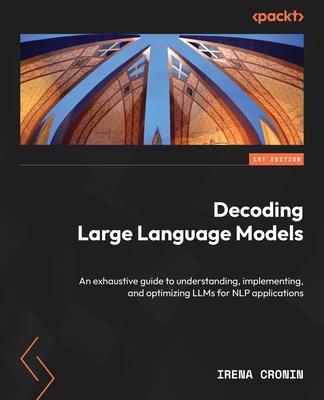Explore the architecture, development, and deployment strategies of large language models to unlock their full potential
Key Features:
- Gain in-depth insight into LLMs, from architecture through to deployment
- Learn through practical insights into real-world case studies and optimization techniques
- Get a detailed overview of the AI landscape to tackle a wide variety of AI and NLP challenges
- Purchase of the print or Kindle book includes a free PDF eBook
Book Description:
Ever wondered how large language models (LLMs) work and how they're shaping the future of artificial intelligence? Written by a renowned author and AI, AR, and data expert, Decoding Large Language Models is a combination of deep technical insights and practical use cases that not only demystifies complex AI concepts, but also guides you through the implementation and optimization of LLMs for real-world applications.
You'll learn about the structure of LLMs, how they're developed, and how to utilize them in various ways. The chapters will help you explore strategies for improving these models and testing them to ensure effective deployment. Packed with real-life examples, this book covers ethical considerations, offering a balanced perspective on their societal impact. You'll be able to leverage and fine-tune LLMs for optimal performance with the help of detailed explanations. You'll also master techniques for training, deploying, and scaling models to be able to overcome complex data challenges with confidence and precision. This book will prepare you for future challenges in the ever-evolving fields of AI and NLP.
By the end of this book, you'll have gained a solid understanding of the architecture, development, applications, and ethical use of LLMs and be up to date with emerging trends, such as GPT-5.
What You Will Learn:
- Explore the architecture and components of contemporary LLMs
- Examine how LLMs reach decisions and navigate their decision-making process
- Implement and oversee LLMs effectively within your organization
- Master dataset preparation and the training process for LLMs
- Hone your skills in fine-tuning LLMs for targeted NLP tasks
- Formulate strategies for the thorough testing and evaluation of LLMs
- Discover the challenges associated with deploying LLMs in production environments
- Develop effective strategies for integrating LLMs into existing systems
Who this book is for:
If you're a technical leader working in NLP, an AI researcher, or a software developer interested in building AI-powered applications, this book is for you. To get the most out of this book, you should have a foundational understanding of machine learning principles; proficiency in a programming language such as Python; knowledge of algebra and statistics; and familiarity with natural language processing basics.
Table of Contents
- LLM Architecture
- How LLMs Make Decisions
- The Mechanics of Training LLMs
- Advanced Training Strategies
- Fine-Tuning LLMs for Specific Applications
- Testing and Evaluating LLMs
- Deploying LLMs in Production
- Strategies for Integrating LLMs
- Optimization Techniques for Performance
- Advanced Optimization and Efficiency
- LLM Vulnerabilities, Biases, and Legal Implications
- Case Studies - Business Applications and ROI
- The Ecosystem of LLM Tools and Frameworks
- Preparing for GPT-5 and Beyond
- Conclusion and Looking Forward
